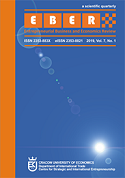How Absorptive Capacity and Organisational Learning Orientation Interact to Enable Innovation Capability? An Empirical Examination
How Absorptive Capacity and Organisational Learning Orientation Interact to Enable Innovation Capability? An Empirical Examination
Author(s): Monika StelmaszczykSubject(s): Business Economy / Management, Micro-Economics, Management and complex organizations
Published by: Uniwersytet Ekonomiczny w Krakowie
Keywords: absorptive capacity; innovation capability; organisational learning orientation; knowledge sharing; SEM;
Summary/Abstract: Objective: The main objective of the article is to examine the effect of organisational learning orientation (OLO) and absorptive capacity (AC) on innovation capability (IC). Research Design & Methods: The hypotheses were tested on a sample of 239 respondents. Hypotheses were verified by means of structural equation modelling (SEM), using the asymptotically distribution-free method (ADF). Findings: A change in organisational learning orientation brings about changes in absorptive capacity, which in turn influences business innovation capability. Absorptive capacity is affected mostly by two dimensions of organisational learning orientation: commitment to learning (OLO1) and open-mindedness (OLO3). In turn, absorptive capacity affected by organisational learning orientation has the strongest impact on product innovation (IC1), a lesser impact on process innovation (ICA2), and the weakest impact on managerial innovation (IC3). Moreover, the process of knowledge sharing (KS) mediates the effect of absorptive capacity on each of the dimensions of innovation capability. Implications & Recommendations: First, this study expands our understanding of the effect of learning orientation on absorptive capacity. Second, it confirms the presence of a statistically significant and positive relationship between absorptive capacity and innovation capability. The third implication concerns the indirect dependencies between absorptive capacity and innovation capability. Contribution & Value Added: The study identifies and examines mechanisms that support the transformation of external knowledge – already acquired and used by an organisation – into innovations.
Journal: Entrepreneurial Business and Economics Review
- Issue Year: 8/2020
- Issue No: 1
- Page Range: 7-32
- Page Count: 26
- Language: English

